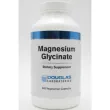Keeping the Beat: How Magnesium Glycinate Supports Heart Health

Article by Arnie Gitomer Apr 25, 2024
Heart disease is a prevalent medical condition that affects millions of people worldwide. It is a leading cause of death and encompasses various conditions such as coronary artery disease, heart attacks, and high blood pressure.
While certain risk factors for heart disease, such as family history and age, cannot be changed, adopting a heart-healthy lifestyle can significantly reduce the risk of developing cardiovascular issues.
Magnesium is an essential nutrient that plays a crucial role in supporting heart health. Magnesium is an important mineral in numerous bodily processes, including nerve function, muscle contraction, and regular heart rhythm. In recent years, magnesium supplementation has gained attention for its potential cardioprotective effects.
One specific form of magnesium that has been extensively studied for its heart health benefits is Magnesium Glycinate. In this blog, we will explore the role of magnesium in heart health, its unique properties, and its potential benefits in supporting cardiac function.
Understanding Heart Health and Magnesium's Role
Heart health is a critical aspect of overall well-being. Cardiovascular diseases, including heart disease, are a major health concern worldwide. Heart disease refers to various conditions that affect the heart and blood vessels, such as coronary artery disease, heart attacks, and heart failure.
Several risk factors contribute to the development of heart disease, including high blood pressure, high cholesterol levels, smoking, obesity, and a sedentary lifestyle. While lifestyle modifications and medication can control these risk factors, certain nutrients, such as magnesium, can also play a significant role in supporting heart health.
Magnesium is an essential mineral involved in over 300 biochemical reactions in the body. It is required for proper muscle and nerve function, maintaining a regular heart rhythm, and supporting the immune system.
In terms of heart health, magnesium is particularly important in regulating blood pressure, maintaining healthy blood vessels, and preventing the formation of blood clots. Research suggests that low magnesium levels may be associated with an increased risk of heart disease and heart attacks.
How Magnesium Glycinate Differs from Other Forms of Magnesium
Magnesium is available in various forms, each with its own characteristics and benefits. Magnesium Glycinate is a specific form of magnesium that is highly bioavailable and easily absorbed by the body. Here's how Magnesium Glycinate differs from other forms of magnesium:
- High absorption: Magnesium Glycinate has excellent absorption rates and is readily taken up by the body's cells.
- Gentle on the stomach: Unlike other forms of magnesium, Magnesium Glycinate is gentle on the stomach and less likely to cause digestive discomfort or diarrhea.
- Less laxative effect: Some magnesium supplements can have a laxative effect, leading to loose stools. Magnesium Glycinate is less likely to cause this side effect.
- Minimal interference with other nutrients: Magnesium Glycinate does not interfere with the absorption of other essential nutrients, making it a suitable option for supplementation.
When choosing a magnesium supplement, factors such as absorption rates, bioavailability, and potential side effects must be considered. Magnesium Glycinate is a well-tolerated and easily absorbed form of magnesium, making it ideal for supporting heart health.
Studies Supporting Magnesium Glycinate's Cardioprotective Effects
Several studies have investigated the potential cardioprotective effects of Magnesium Glycinate. These studies have provided valuable insights into the role of Magnesium Glycinate in maintaining heart health and reducing the risk of heart disease.
A study published in the journal Nutrients examined the effects of Magnesium Glycinate on blood cholesterol levels in individuals with high cholesterol. The study found that supplementation with Magnesium Glycinate led to a significant reduction in total cholesterol, LDL cholesterol (often called "bad" cholesterol), and triglyceride levels. These improvements in lipid profiles are essential for reducing the risk of atherosclerosis and cardiovascular disease.
Another study published in the Journal of the American College of Nutrition investigated the relationship between magnesium intake and the risk of heart disease. The study found that higher magnesium intake was associated with a lower risk of developing heart disease. The authors concluded that increasing dietary magnesium intake through food sources or supplementation could be an effective strategy for reducing the risk of heart disease.
Mechanisms: How Magnesium Glycinate Supports Heart Health
Magnesium Glycinate supports cardiac function through various mechanisms within the body. Here are some of the key ways in which Magnesium Glycinate promotes heart health:
- Maintaining healthy blood vessels: Magnesium Glycinate helps relax and dilate the blood vessels, promoting healthy blood flow and reducing the risk of high blood pressure.
- Supporting heart muscle function: Magnesium is essential for proper heart muscle contraction and relaxation. Adequate levels of Magnesium Glycinate ensure optimal cardiac function.
- Balancing electrolytes: Magnesium is vital in maintaining electrolyte balance within the body, including the proper balance of sodium, potassium, and calcium. This balance is crucial for maintaining a regular heart rhythm.
- Protecting against oxidative stress: Magnesium Glycinate acts as an antioxidant, protecting the heart and blood vessels from oxidative damage caused by free radicals.
By supporting these essential functions within the cardiovascular system, Magnesium Glycinate can help maintain heart health and reduce the risk of cardiovascular disease.
Addressing Common Concerns and Misconceptions
Debunking myths about magnesium supplementation is essential to understanding its role in heart health. Concerns regarding over-supplementation and potential side effects must be addressed to ensure safe usage.
Addressing these misconceptions can foster confidence in utilizing magnesium glycinate as a cardioprotective measure. By clarifying doubts and providing accurate information, individuals can make informed decisions about incorporating magnesium supplements into their daily regimen for optimal heart health support. Understanding the facts is crucial in maximizing the benefits of magnesium glycinate for cardiovascular well-being.
Debunking Myths About Magnesium Supplementation
Magnesium supplementation is often misunderstood, and myths circulate about its effectiveness and safety. Contrary to popular belief, magnesium supplementation, especially magnesium glycinate, is generally safe when taken at recommended doses. It does not pose a significant risk of side effects when used appropriately.
Misconceptions about magnesium supplementation should not deter individuals from exploring its potential advantages for cardiovascular health.
Addressing Concerns About Over-Supplementation and Side Effects
Concerns sometimes arise regarding over supplementation and potential side effects of magnesium supplementation. Excessive intake of magnesium supplements can lead to digestive issues such as diarrhea.
However, when taken within recommended doses, most individuals generally tolerate magnesium glycinate. As with any supplement, moderation is key, and consulting a healthcare provider before starting any new regimen is advisable to ensure it aligns with your specific health needs and goals.
Pure Encapsulations Magnesium Glycinate 120 MG
Pure Encapsulations Magnesium Glycinate 120 mg offers a highly absorbable form of magnesium, crucial for heart health. This supplement supports cardiac function, helping regulate blood pressure and maintain healthy cholesterol levels.
Studies support magnesium glycinate's cardioprotective effects, which promote cardiovascular well-being. Incorporating this form of magnesium into your routine can positively impact your heart health by supporting vital functions essential for overall well-being.
Conclusion
Understanding the role of magnesium glycinate in supporting heart health is crucial. Through its unique properties and cardioprotective effects backed by studies, magnesium glycinate stands out among other forms of magnesium. Debunking myths and addressing concerns about over-supplementation ensures safe consumption.
By shedding light on Pure Encapsulations Magnesium Glycinate 120 mg, you can make an informed choice for your heart health. Stay informed, prioritize your heart's well-being, and consider incorporating magnesium glycinate into your daily routine for a healthy heart.
 |
Read more about Arnie Gitomer |
Product Search Results

|
Mag Glycinate 100 mg | Douglas Laboratories | Login for Willner pricing. $48.60 | 66661 |

|
Mag Glycinate 200 Chel | Carlson Laboratories | $37.48 | 12832 |

|
Mag Glycinate Chel 400 mg | Country Life | $19.27 | 67590 |

|
Magnesium Glycinate 120 mg | Pure Encapsulations | Login for Willner pricing. $26.00 | 23148 |

|
Trace Mins cap | Thorne Research | Login for Willner pricing. $24.00 | 18913 |
